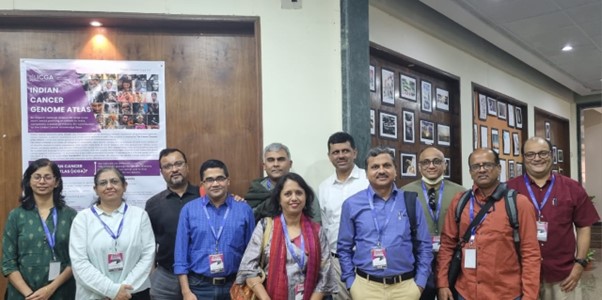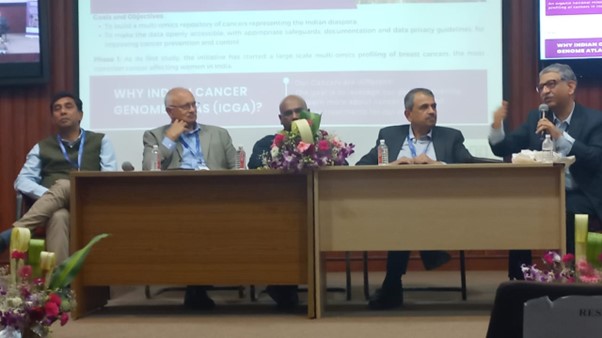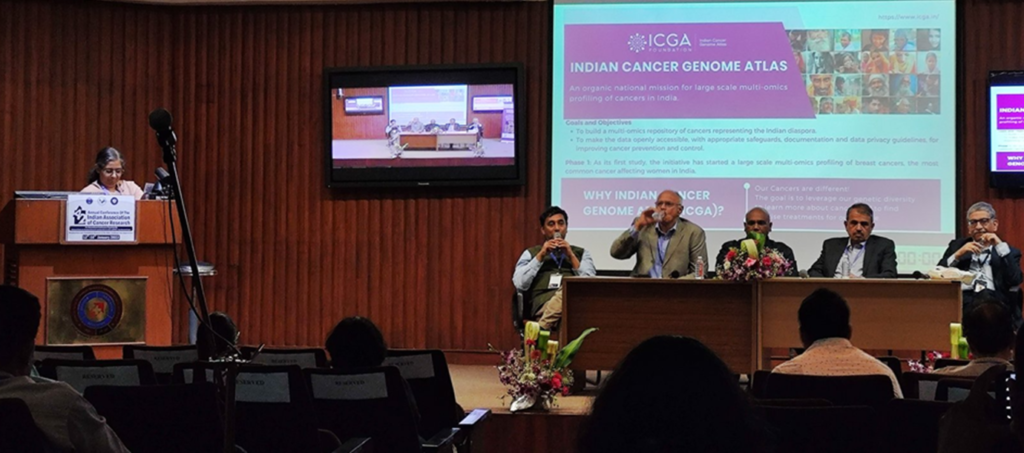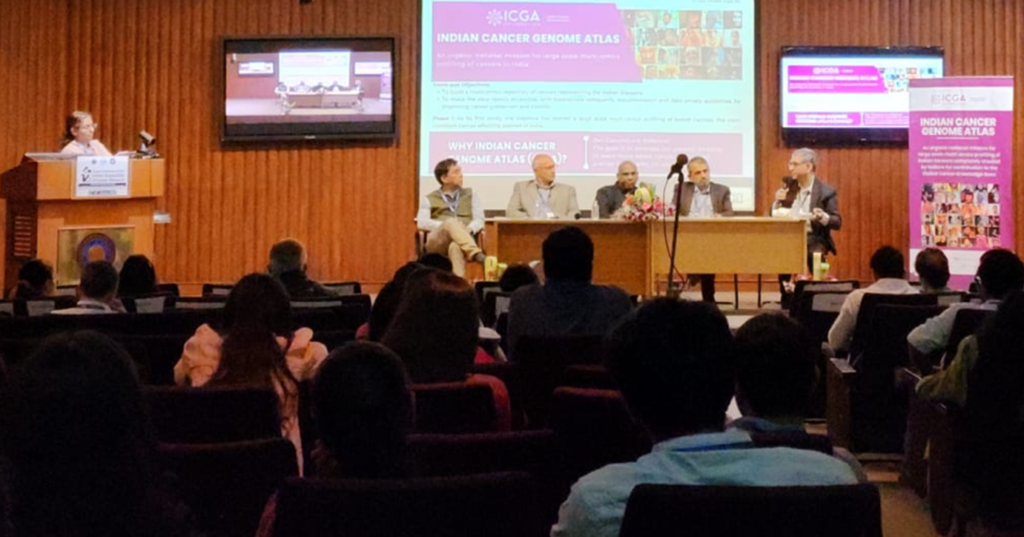Actionable Cancer Omics- Opportunities and Challenges
Indian Cancer Genome Atlas (ICGA) Foundation held a panel discussion on 15 January 2023 during the annual conference of Indian Association of Cancer Research (IACR) at Navi Mumbai. Dr. Shantanu Chowdhury (Structural Biologist, and Professor at CSIR-Institute of Genomics and Integrative Biology, Delhi), Dr. Anand Deshpande (Founder, Chairman, and Managing Director, Persistent Systems), Dr. Amit Dutt (Integrated Genomics Scientist at ACTREC, Navi Mumbai), Dr. Sudeep Gupta (Professor Medical Oncology and Director, ACTREC, Navi Mumbai) and Dr. LS Shashidhara (Professor of Biology, IISER Pune) were the panelists at this event, which was moderated by Dr. Suveera Dhup, Chief Operating Officer, ICGA Foundation.
The event was well attended by clinicians from Tata Memorial Centre and ACTREC, Mumbai, and attendees of the IACR meeting. The discussion touched upon the current state of cancer omics in India and the opportunities available to improve patient treatment and outcomes. The attendees suggested that ICGA could consider using its platform to store and curate molecular profiles of Indian cancers from pre-existing studies which meet its quality control and provide access to researchers in structured manner. Some of the important discussion points are summarized below:
Challenges in actionable cancer omics include:
- Complexity of data: High-throughput genomic technologies generate large amounts of data that can be difficult to interpret and translate into clinically relevant information.
- Variability in tumor genetics: There can be significant variability in the genetic makeup of different tumors within the same cancer type, making it difficult to develop generalized treatment approaches.
- Rarity of actionable mutations: Many actionable mutations in cancer are rare, making it difficult to identify large patient populations that can be treated with precision therapies.
- High cost: The cost of genomics and precision medicines is still high, making it difficult for many patients to access these new technologies.
- Limited understanding of rare cancer types or subtypes: This makes it difficult to understand the underlying biological mechanisms of these cancer types and develop appropriate treatments.
- Limited healthcare infrastructure in certain regions and limited trained human resource: In certain regions, there may be a lack of access to the necessary technology, expertise, and resources for actionable cancer omics, making it difficult to implement precision medicine strategies.
Opportunities in actionable cancer omics include:
- Use of Standard Procedures and Best Practices: Overall, the field of experimental and computational cancer omics is changing rapidly, driven by advances in technology and increased collaboration and data sharing. Standards are being developed and followed to ensure that data is of high quality and comparable between studies, and to facilitate data sharing and interoperability.
- Adoption of best practice guidelines for sample collection and processing, such as the International Cancer Genome Consortium (ICGC) and the Cancer Genome Atlas (TCGA) guidelines, to ensure that data is of high quality and comparable between studies.
- Use of standardized data formats, such as the variant call format (VCF) for genomic data, and the gene expression omnibus (GEO) for transcriptomic data, to facilitate data sharing and interoperability.
- Use of standard ontologies, such as the Human Phenotype Ontology (HPO) and the Gene Ontology (GO), to annotate and classify cancer omics data.
- Compliance with data privacy and security regulations, such as the Health Insurance Portability and Accountability Act (HIPAA) and the General Data Protection Regulation (GDPR), protects patient privacy and confidentiality.
- Personalized treatment: Actionable cancer omics allows for the identification of targeted therapies and precision medicine strategies that are tailored to the specific genetic makeup of a patient’s tumor, leading to improved patient outcomes.
- Identification of new drug targets: The analysis of genomic data can lead to the discovery of new drug targets and the development of targeted therapies that specifically target the genetic mutations present in a patient’s tumor.
- Improved efficiency of clinical trials: Precision medicine strategies that incorporate genomic data can help identify patients who are most likely to respond to a particular treatment and improve the overall efficiency of clinical trials.
- Early diagnosis and prevention: Actionable cancer omics can help identify genetic mutations that may predispose individuals to certain types of cancer, allowing for earlier diagnosis and preventive measures.
This calls for collaborative efforts so that the data collected is of high quality following Good Practices and Guidelines, right from sample collection from patients, and the use of standard formats, to omics, analysis, and interpretation. So that the data is of high quality and comparable between studies. Equally important is to have open access data sharing and interoperability. These principles are part of Indian Cancer Genome Atlas’ DNA and its intent to follow through with its projects.
The Foundation is thankful to Dr Sorab Dalal and organizers of IACR 2023 for hosting the panel discussion and providing its platform for this important conversation.



